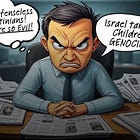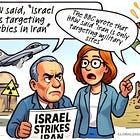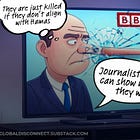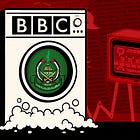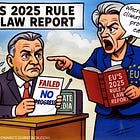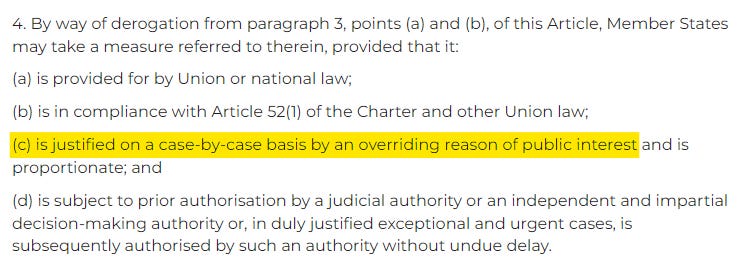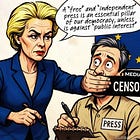Strings Attached on Truth: The Puppet Show Disguised as News
An Insider’s View on How News Stories Are Crafted and Controlled
Over time, I have written in detail, from an insider’s view, how the media ecosystem works—not as a neutral source of information, but as a complex, interconnected machine shaped by government control, corporate interests, and ideological agendas. From historic roots to today’s global networks and syndication systems, this summary reveals how media structures, key players, and strategic alliances work together to shape narratives, influence public perception, and advance political agendas—always at the expense of truth. Beyond debunking lies, it is more important to understand how this system operates, so we can see the bigger picture behind the stories we consume and recognize the forces shaping minds worldwide.
The evolution of modern media reveals a disturbing trajectory from public service to propaganda tool, shaped by decades of government control, corporate consolidation, and foreign influence. From the BBC’s wartime role in British propaganda and the U.S. Office of Censorship during WWII, to the CIA’s covert Operation Mockingbird manipulating Cold War narratives, media has consistently served powerful agendas. The 1996 Telecommunications Act further commercialized news, prioritizing ratings over truth, while the rise of outlets like Al Jazeera, especially its youth-focused AJ+ platform, underscores how foreign state-funded media now shape Western discourse. Today, sensationalism, emotional storytelling, and strategic influence have replaced objective journalism—leaving the public uninformed, distracted, and manipulated.
But government influence isn’t the only way media controls public perception; the gatekeepers of global news also play a decisive role.
If Reuters and AP don’t report a story, it effectively vanishes from international awareness. These wire services are the backbone of global journalism, supplying content to thousands of outlets. In regions with limited resources, their coverage becomes the only source of news. When they ignore events—like the recent killing of Palestinian aid workers by Hamas—entire populations remain unaware. This editorial silence shapes reality itself for billions, proving that omission is one of media’s most powerful tools.
This selective reporting extends beyond omission to bias in what is amplified or suppressed. When atrocities by groups like Hamas or Iran go unreported or are doubted, while Israeli actions are intensely scrutinized, the result is a distorted global narrative. Media bias isn’t accidental; it’s a system that dictates what billions perceive as truth.
It was revealed that since 2008 AP, like all of its sister organizations, collaborates with Hamas censorship. Matti Friedman, AP correspondent (2006–2011), has written and spoken extensively about the entanglement between the AP and Hamas.
A critical but often overlooked factor in shaping the Israel-Palestine conflict narrative is the media’s heavy reliance on NGOs. These organizations collect data, witness events, and release reports that serve as primary sources for international journalism. Journalists frequently depend on NGOs for access and insights they cannot independently verify—especially amid restricted access to conflict zones like Gaza. However, many NGOs exhibit selective reporting, often underplaying Hamas’s tactics such as embedding military infrastructure in civilian areas, and omitting broader geopolitical contexts like Iranian support for terrorist groups. Furthermore, journalists often have close ties to NGOs, sometimes working in both spheres, which can skew coverage toward particular perspectives. The result is a feedback loop where NGO narratives dominate media stories, editorial decisions favor simplified portrayals of victimhood, and complex realities become obscured. The deliberate ban on quoting watchdogs like NGO Monitor exemplifies the entrenched conflicts of interest that distort public understanding and fuel biased reporting.
One constant lie we hear is how “Israel is banning international media in Gaza.” The claim could be further from the truth, while embedding with military units and respecting operational restrictions is standard in war reporting globally, the media applies a double standard to Gaza. Many demand Israel grant unrestricted press access to a combat zone controlled by a terrorist organization, yet Israel’s reasonable restrictions are condemned as censorship. Meanwhile, much of the footage from Gaza comes from individuals affiliated with Hamas or terror groups—facts well-documented but ignored. By publishing these unvetted narratives as neutral journalism, the media becomes complicit in spreading propaganda, amplifying lies, and attacking truth.
Behind these broadcasts lies a vast network of media professionals committed to advancing the Palestinian cause. Journalists, editors, producers, and commentators—whether consciously or not—amplify messaging aligned with Palestinian political goals. Operating across borders and platforms, this ecosystem ensures the Palestinian narrative dominates many Western and global outlets, shaping public opinion and influencing policy worldwide.
Enter Al Jazeera, which does not function as an independent news outlet but as a propaganda engine for Qatar and by extension Hamas. Its coverage prioritizes the group’s political goals, avoiding reports on Hamas’s crimes or repression. Instead, it frames Israel as the sole aggressor and Hamas as a heroic resistance movement. Through inflated casualty lists, omission of inconvenient facts, and glorification of terror operatives, Al Jazeera manipulates public perception—shielding Hamas from scrutiny while flooding global discourse with weaponized narratives disguised as news.
This influence doesn’t stop at Al Jazeera’s own platforms. In today’s interconnected media landscape, content syndication allows Al Jazeera, backed by the Qatari regime, to embed its messaging across major Western outlets—CNN, The Guardian, Fox News, and more—often without audiences knowing the source. This covert pipeline gives Qatar immense soft power, shaping narratives on Middle Eastern affairs under the guise of independent journalism.
Qatar’s Media City Qatar (MCQ) further cements this influence. Hosting global outlets like Bloomberg, CNN, and Euronews, and training journalists at Northwestern University in Qatar, MCQ builds a state-aligned media ecosystem. Through strategic partnerships and tech investments, Qatar exports its ideological goals worldwide—often without transparency or attribution—it crafted an empire in soft power that disguises propaganda as innovation, entertainment and news.
MCQ hosts Al Jazeera’s media institute, it trains media professionals in virtually every aspect of media, and many international media organizations pay large amounts of money to send their staff to Qatar and other places for training at AJMI or to enroll in its online courses. Since launching in 2004, the Institute has educated more than 75,000 people across the world. Let that sink in: in two decades, the Muslim Brotherhood has trained 75,000 media professionals around the world, working today virtually in every single media organization worldwide!
Al Jazeera’s recent claim that 231 journalists died in Gaza is emblematic of this manipulation. Investigations reveal many listed were Hamas operatives, propagandists, or even alive after being declared dead. Names like Abdallah Aljamal, a hostage-keeper, and Bilal Jadallah, a central figure in Hamas’s media machine, expose how terrorist affiliates masquerade as journalists. This calculated information warfare is amplified by Western media, knowingly or not, further distorting the narrative worldwide.
The BBC shares much of this complicity. Since October 7, it has avoided calling Hamas terrorists, amplified terror-linked sources, and aired misleading reports like the false Al-Ahli hospital explosion narrative. Many individuals featured have direct ties to Hamas or Palestinian Islamic Jihad. It’s director states journalists in Gaza are “independent.” This pattern is deliberate, fueling misinformation, endangering lives, and betraying public trust. The BBC’s taxpayer-funded platform must be held accountable for laundering terror narratives under the guise of journalism.
How do we know when it comes to the BBC, it is all deliberate? Unlike most publicly funded media around the world, the BBC is uniquely government-controlled. When we think of state-controlled media, countries like China, Russia, Qatar, North Korea, or Iran usually come to mind—not Britain. Yet the BBC was created explicitly to serve the British Crown and government interests. From Orwell’s wartime revelations of censorship and propaganda to today’s editorial decisions shaped by political appointments and government funding, the BBC functions as a powerful instrument of soft power. Its alliances with outlets like Al Jazeera, selective coverage, and embedded influence from political and religious advisory groups reveal a systemic bias. These polished broadcasts are modern echoes of Orwell’s Ministry of Truth—manufacturing consent and molding public perception to fit official government agendas.
BBC’s laundering of Hamas propaganda is a documented fact. The BBC has long defended its coverage of the Israel–Hamas war as “balanced” and “impartial.” But a leaked internal memo, obtained and published by The Telegraph, has now exposed what many already suspected: BBC Arabic repeatedly distorted reporting to favor Hamas, minimized Israeli suffering, and broadcast propaganda under the banner of “public service journalism.” The leaked memo also documents how this rot is not confined to BBC Arabic.
All while the EU praises obedient media and punishes narrative dissent in their latest Rule of Law Report. They condemn Hungary while praising media such as NRK, ZDF and SVT, the difference? The narrative.
Starting August 8th, the European Union’s European Media Freedom Act (EMFA) will come into effect. But read the fine print. It promises that no journalist will be pressured to reveal sources, spied on, or arrested—unless it is “provided for by Union or national law” and “justified in the specific case by an overriding reason of public interest” and deemed “proportionate.”
Translation: you’re free to report—until the government decides your reporting is against the “public interest.” And what qualifies as “public interest”? The law doesn’t say. That definition will shift with political priorities, interpreted by the same political class that increasingly treats dissent as disinformation, and disinformation as extremism.




